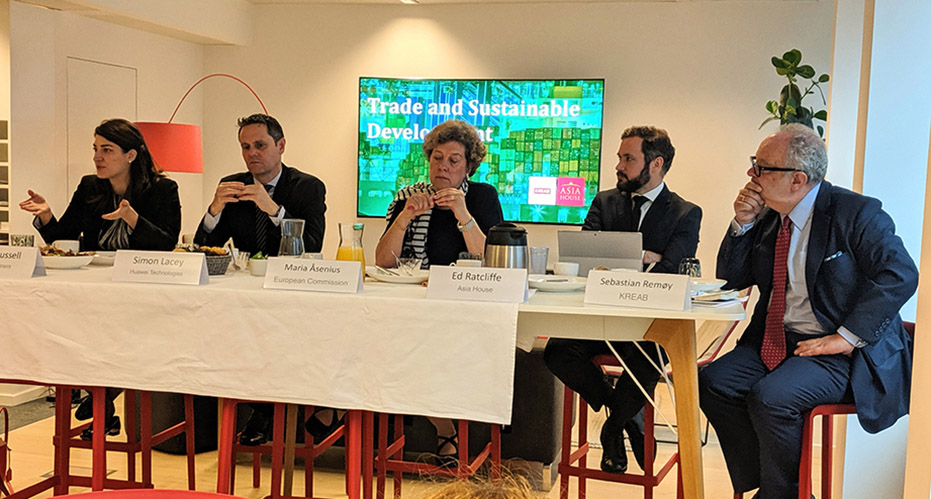Driving commercial and political engagement between Asia, the Middle East and Europe
Driving commercial and political engagement between Asia, the Middle East and Europe
Driving commercial and political engagement between Asia, the Middle East and Europe

The relationship between emerging technologies and sustainable development is explored in a new advisory note prepared by Asia House Advisory.
Rapid economic development in Asia is driving a growth in carbon footprints across the region. The advisory note assesses the options for prioritising sustainable development in response to this challenge, including the role digital technologies have to play.
The advisory note, titled ‘Are Trade and Technology the Key to Sustainable Development?’, was launched at an Asia House event in Brussels co-hosted with Kreab, an Asia House Corporate Member, on 5 June, featuring leading figures from industry and diplomacy.
Topics covered in the off-the-record discussion ranged from how the European Union has sought to integrate sustainable development into its trade policy, including through its relationship with China, to the implementation of technologies to create greater inclusion within trade–driven economic growth.
The event was introduced by Sebastian Remøy, President Public Affairs Kreab, and included a panel discussion moderated by Ed Radcliffe, Head of Advisory at Asia House. The panel featured Maria Åsenius – Head of Cabinet for Cecilia Malmström, Commissioner for Trade, European Commission; Simon Lacey – Global Government Affairs, International Trade at Huawei Technologies; and Jodie Rousell – Managing Director at Acacia Partners and formerly the CEO Global Solar Council.
Participants in the discussion included representatives from multinational companies, policy diplomatic missions and official EU institutions.
About the advisory note
The Asia House advisory note analyses how digital technologies have a significant role to play in the green transition, while highlighting the mixed socio-economic implications such technologies bring.
The note also explores specific technologies which could provide badly–needed solutions to sustainable development in the region. Blockchain technology can significantly improve efficiencies in trade procedures, leading to a reduction in costs and a more safe and sustainable supply chain. Artificial intelligence, meanwhile, could transform trade and supply chains by predicting future trends, immediate consumer behaviour and demand, and by managing supply chains and warehouses more efficiently.
The impact on sustainable development of longer-term innovation is also explored. Improvements in 3D printing and the shrinking cost of industrial robotic systems could allow small-scale production close to consumer centres to be more cost-effective and less carbon–intensive than centralised production and large logistics chains. Increased use of the Internet of Things will enhance the use of other technologies by enabling a more effective method of storing, accessing and using data.
Ed Ratcliffe, Head of Asia House Advisory, said: “The bottom line of these technologies is their ability to reduce both emissions and trade costs by creating efficiencies, changing energy consumption patterns and increasing access to trade by reducing financial and physical barriers.
“The challenge for digital technologies in being useful tools to further sustainable development is scalability and diffusion. To be available for widespread use, supportive regulation needs to be in place. Our advisory note recommends that policymakers create national, regional and global regulation that allows these technologies to develop and flourish, but also takes into account privacy issues, security concerns and the impact of technology on the workforce.”
To receive a copy of the paper, or to discuss this topic with Asia House Advisory in more detail, please contact advisory@asiahouse.co.uk.
